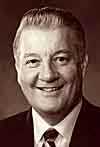
John H. Groberg

John H. Groberg
April 2001
any properly ordained man who is clean in hand, heart, and mind can connect with the unlimited power of the priesthood. I learned this lesson well as a young missionary years ago in the South Pacific.
My first assignment was to a small island hundreds of miles from headquarters, where no one spoke English, and I was the only white man. I was given a local companion named Feki who was then serving a building mission and was a priest in the Aaronic Priesthood.
After eight seasick days and nights on a small, smelly boat, we arrived at Niuatoputapu. I struggled with the heat, the mosquitoes, the strange food, culture, and language, as well as homesickness. One afternoon we heard cries of anguish and saw a family bringing the limp, seemingly lifeless body of their eight-year-old son to us. They wailed out that he had fallen from a mango tree and would not respond to anything. The faithful father and mother put him in my arms and said, "You have the Melchizedek Priesthood; bring him back to us whole and well."
Though my knowledge of the language was still limited, I understood what they wanted, and I was scared. I wanted to run away, but the expressions of love and faith that shone from the eyes of the parents and brothers and sisters kept me glued to the spot.
I looked expectantly at my companion. He shrugged and said, "I don't have the proper authority. You and the branch president hold the Melchizedek Priesthood." Grasping at that straw, I said, "Then this is the duty of the branch president."
No sooner had I said this than the branch president walked up. He had heard the commotion and returned from his garden. He was sweaty and covered with dirt and mud. I turned and explained what had happened and tried to give the young boy to him. He stepped back and said, "I will go and wash and put on clean clothes; then we will bless him and see what God has to say."
In near panic, I cried, "Can't you see? He needs help now!"
He calmly replied: "I know he needs a blessing. When I have washed myself and put on clean clothes, I will bring consecrated oil, and we will approach God and see what His will is. I cannot — I will not — approach God with dirty hands and muddy clothes." He turned and left me holding the boy. I was speechless.
Finally he returned, clean in body and dress and, I sensed, in heart as well. "Now," he said, "I am clean, so we will approach the throne of God."
That marvelous Tongan branch president, with clean hands and a pure heart, gave a beautiful and powerful priesthood blessing. I felt more like a witness than a participant. The words of the Psalmist came to my mind: "Who shall ascend into the hill of the Lord? . . .
"He that hath clean hands, and a pure heart."4 On that tiny island a worthy priesthood holder ascended into the hill of the Lord, and the power of the priesthood came down from heaven and authorized a young boy's life to continue.
With the fire of faith glowing from his eyes, the branch president told me what to do. Much additional faith and effort was required, but on the third day that little eight-year-old boy, full of life, was reunited with his family.
I hope you understand and feel these truths. This was a tiny island in the midst of a huge ocean — with no electricity, no hospital, no doctors — but none of that mattered. For in addition to great love and faith, there was a branch president who held the Melchizedek Priesthood, who understood the importance of cleanliness of hand and heart and its outward expression in cleanliness of body and dress, who exercised the priesthood in righteousness and purity according to the will of God.
Return to top